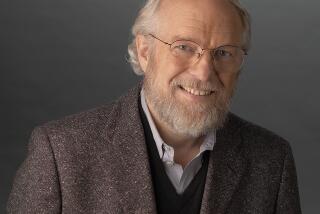Silicon Beach Firm Finds the Road to Software Success
- Share via
Success as a computer software entrepreneur has come in a hurry to Charles Jackson. As recently as 1982, Jackson was in his sixth year of graduate school and was, in the eyes of his family, a “professional student.”
Today, Jackson’s company, Silicon Beach Software, publishes two of the hottest-selling software programs available for Apple Computer’s Macintosh computers. One of many software publishers riding the Macintosh-fueled desk-top publishing boom, Silicon Beach should post sales of $4 million to $5 million this year, only its fourth full year in business, and more than four times 1986 sales of $900,000.
Jackson said sales could double to $8 million to $10 million in 1988 if Silicon Beach successfully introduces five new software packages as planned, and if the company’s SuperPaint software package keeps disappearing off retailers’ shelves. Currently, Silicon Beach is shipping 6,000 SuperPaint copies per month to retailers nationwide, Jackson said. Silicon Beach receives about $40 of the $99 retail price charged for SuperPaint.
SuperPaint Draws Raves
Silicon Beach’s continued well-being is also dependent on sales of Macintosh computers, which by most reckonings will set records this year. Lawrence Magid, a computer market analyst with Seybold Group of San Jose, said he “would not be surprised” if 1 million Macintoshes are sold in 1987, compared with the estimated 1.3 million Macs sold since the computer’s introduction in 1984 through 1986.
Ever since its introduction in November, SuperPaint has drawn enthusiastic reviews in the computer trade press, and, in February, it won an annual Info World magazine readers’ poll for best graphics presentation software package of 1986.
SuperPaint enables computer users to “cut and paste” and otherwise manipulate pieces of electronic text, a critical element of the desk-top publishing process. SuperPaint and FullPaint, which is published by Ann Arbor Softworks, are the two most popular “paint” programs on the market, according to Magid.
“What SuperPaint does is turn your computer into an electronic easel and paint brush. You can form any shape, make circles or fill in gaps,” Magid said. SuperPaint also uses the high resolution of the Apple LaserWriter printer to unprecedented advantage, he said.
Silicon Beach’s other fast-selling program is a video game called Dark Castles, which is being shipped at the rate of 3,000 copies per month, Jackson said.
SuperPaint is a successor product to MacPaint, a software program that at first was given free of charge to buyers of Apple Macintosh computers. Last year, Apple decided to “unbundle,” or not include, the MacPaint product, a move designed to encourage outside software publishers to write competing products. MacPaint now is generally being outsold by both SuperPaint and FullPaint, Magid said.
“As long as Apple was giving the programs away free, it was difficult for someone to come in from outside and charge for one, no matter what the drawbacks of the Apple product might have been,” Magid said.
For the past few months, SuperPaint and Dark Castles have been at the top of the sales charts for Bonsu Corp., a Sunnyvale-based software distributor that deals exclusively in Apple Macintosh software, said Roberta Sosbee, Bonsu’s vice president of marketing.
SuperPaint is also one of the two most popular Macintosh programs being sold by computer distributor Softsel Computer Products Inc. of Inglewood, according to the company’s new products manager, Alex Crespi.
Employment at Silicon Beach now totals 17, up from five a year ago. Last year’s $900,000 in revenue was double that of the year before.
Jackson, 38, a San Diego native who was an officer in the Marine Corps for four years, started his company in 1984 with his and his wife’s $10,000 life’s savings. For two years before starting the company, Jackson taught computer training seminars.
When Apple introduced the Macintosh in early 1984, Jackson said, he knew that the time was right to enter the software business. He had read about and seen many successful software companies that started up after International Business Machines Corp. introduced its personal computer in 1981.
“Whenever a new computer is introduced, there is going to be a period of time when there is very little software available for it,” he said. “So there is lots of demand for any new titles and it’s not so hard to get your products reviewed in the trade press. The cost of entry is something you can afford without going out for $1 million in venture capital.”
Closely Held Stock
Jackson and his wife, Hallie, own 90% of the stock in Silicon Beach. An outside investor acquired 10% of the company’s stock last year.
Jackson applied for and received admission into Apple’s certified developers program for software publishers, which entitled him to reduced prices on equipment and software needed to write Apple software.
Silicon Beach’s first product was a game called Airborn, written by Jonathan Gay, a 17-year-old San Diego High School student. It later became the No. 1-selling Macintosh game nationwide. Sales totaled 20,000 copies in 1985, Jackson said.
The company’s second product, also introduced in 1985, was a collection of seven software “utilities” that enhanced existing Apple desk-top publishing software. The most popular of the seven was a program called PaintCutter, a text manipulation feature. Its success convinced Jackson to produce a software package focused on “easel” functions, and the seeds of SuperPaint were sewn.

![Monrovia, CA - November 06: Original Apple-1 "NTI" motherboard and an Apple Cassette Adapter (ACI) in an original ByteShop Apple-1 koa wood case with Datanetics Keyboard Rev D [keyboard dated: Sept 21 1976]. Morgana Blackwelder with Hand-built Apple-1 displayed for auction at John Moran Auctioneers on Saturday, Nov. 6, 2021 in Monrovia, CA. (Irfan Khan / Los Angeles Times)](https://ca-times.brightspotcdn.com/dims4/default/ab3eeec/2147483647/strip/true/crop/2393x1600+4+0/resize/320x214!/quality/75/?url=https%3A%2F%2Fcalifornia-times-brightspot.s3.amazonaws.com%2Fee%2F8c%2Fa8b37d02425890021cfcd2b29c00%2Fla-photos-1staff-868241-me-1106-apple-first-unit-005.IK.JPG)




